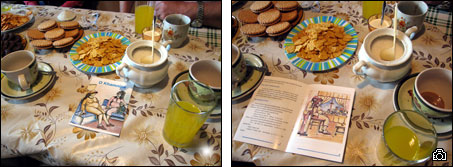 |
 |
 |
 |

Her husband is a non-Roma who works in a saw mill and says that his problems do not derive from the Roma but from the discriminatory attitudes of his Bulgarian fellow workers. The son of the family, also called M, has a technical qualification. When he hears of job vacancies he makes the initial contact via telephone. He normally gets an interview appointment based on his qualifications only to be told that the job is taken when he actually appears in person. It is a complaint that has been made by many Roma and confirmed by many different independent studies. It has, of course, an extremely negative effect on the Roma commitment to education: what is the point of studying against the odds when a culminating success still results in rejection? M. the son, presently works as a waiter in Velingrad.
We all sit round the dining table. I am sitting near one end. In the corner next to the window the television set silently unreels what appears to be the Bulgarian counterpart of an MTV programme. As I watch a band of Afro-Americans plays against a backdrop of dark clouds and lightning.
|
|

I look out the window, towards the mountains, and see duplicate, real-time lightning and some not-yet threatening clouds. The general consensus is that we should all visit M in the restaurant and have dinner there. After we make some photographs B drives off with mother, father and baby.
|
|
 |